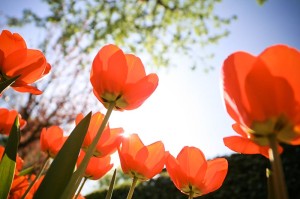How to Manage your Allergy Symptoms?
 After a never ending winter, it’s hard to not be hopeful about signs of spring right around every corner. Though we are very excited for the longer days, warmer temperatures, green grass and joyful budding of trees and flowers, we know pollen will also be back to spoil some of our joy. Not to mention, sources say this pollen season won’t be one of the good! Turns out the early blooming flowers disliked the long, extended cold weather too.
After a never ending winter, it’s hard to not be hopeful about signs of spring right around every corner. Though we are very excited for the longer days, warmer temperatures, green grass and joyful budding of trees and flowers, we know pollen will also be back to spoil some of our joy. Not to mention, sources say this pollen season won’t be one of the good! Turns out the early blooming flowers disliked the long, extended cold weather too.
What does this mean for us allergy sufferers?
All early blooming trees, grasses and flowers will now join forces with mid-season bloomers to create “A Perfect Storm of Pollen”. For more information see: Allergy Alert: tidal wave of pent-up pollen could be headed our way by The Washington Post.
Lucky for our AllergyConsumerReview readers, here are our Top Ten Tips on How to Manage Pollen Allergy Symptoms:
How do I Manage Pollen Allergy Symptoms?
With the Pollen season now moving its way across the USA here are some practical tips for managing your Pollen Allergies. Note that much of our advice costs little, just some good, practical common sense.
The basic premise is to prevent pollen from entering your home and other places under your control where pollen may be in the environment. If that proves impossible, then reduce the pollen to manageable levels through other methods.
- Change clean air filter into your car. Close the windows and re-circulate the air.
- Wash your car regularly, especially if you have a garage, so it’s isn’t tracking pollen into your home and you are not driving around in a car coated with pollen dust.
- Install high capacity furnace filters into your home so that pollen will be stopped in its tracks. The better ones will reduce pollen allergen levels by at least 50% which is a good start.
- Keep your shoes by the door and encourage your guests to take off your shoes when entering the house and wash down the soles, so you are not tracking pollen all over the house.
- Take a shower at night to wash the pollen off your hair. No need to breathe it in off your pillow.
- Close your windows at night, pollen count is at it’s highest at night. It’s best to turn off the fan in your house to re-circulate air. No point in inviting the pollen to come calling.
- Good saline natural spray and then blowing your nose gently or in the shower will help with clearing the pollen in your nose trapped by the cilia.
- If your eyes are itchy? Try a natural eye wash or solution to help rinse your eyes of pollen irritants.
- Managing pollen exposure, airborne pollen is trapped very effectively inside a HEPA air purifier, and the good news is because pollen is relatively large, most filters will do a pretty good job as it is not difficult to trap. This will make your breathing much easier. Blueair, Winix, Austin and Alen air purifiers and others will do an excellent job. It would also help to use a portable desk top air purifier at work.
- Clean regularly, it’s impossible to keep all the pollen dust out, so there really is no alternative to cleaning regularly. It’s best to using a good HEPA vacuum cleaner with a sealed body and zero emissions to vacuum up the pollen. Sebo and Miele vacuums are excellent brands.



